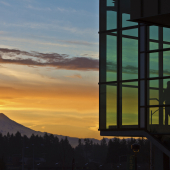Chile is prosperous, with a varied and fascinating geography, and it has a distinguished educational system with many excellent universities, including some of the best on the continent. Employment rates are high in Chile, with many skilled jobs available for potential graduates. The cost of living is reasonable and Chile has enjoyed political and economic stability in recent years.
So why visit a bunch of different countries when you can have everything in one place? Chile truly has it all. Volcanoes, valleys, deserts, the Andes, unspoiled Pacific coastline, Patagonia and further afield, Easter Island, offer activities such as hiking, skiing, swimming, surfing and riding.
And as varied as Chile's landscapes are, so too are the programs available for study there.
Let’s Explore Chile
Rivers of ice, lakes of fire and lush land as far as the eye can see. And within, choices abound for an excellent education. Chile is a stunning country, comprised of impressive beaches, islands and incredible Andean mountain ranges, offering over 2,500 miles of Pacific beauty.
Chile has a truly diverse climate. In general, it is more typical of Mediterranean countries than the rest of South America, with mild winters, little rainfall and less humidity than much of Brazil and Argentina.
The arid and dry Atacama Desert of northern Chile is rich in resources, such as copper. The central zone is the most populated, with cities like the capital Santiago located here. The economic productivity of the centre is complemented by its Mediterranean climate. Southern Chile is rich in forests and farmlands, with volcanoes and lakes scattered across the region. The southern coast is truly an adventureland; a labyrinth of fjords, inlets, canals, peninsulas and islands.
But Chile isn’t simply a list of geographical features. It is also home to many exceptional places of learning. Let’s try and understand Chile a little more and see if it could be the perfect study destination for you.
In total, there are around 25 state universities in Chile, as well as a rising number of private institutions. Many of Chile’s universities are located in Santiago, the capital city, which includes arguably two of the most prestigious in the whole continent: The University of Chile and The Pontifical Catholic University of Chile.
Santiago
Santiago is a student’s paradise. Wander through neighbourhoods with a strong café culture and a bohemian vibe, party districts where the music never sleeps or the financial district of Sanhattan and visit the top of the tallest building in South America.
On a clear day, you will marvel at the dazzling landscape that surrounds Chile’s capital of Santiago. The Andes Mountains scrape the sky in the east and the Chilean Coastal Range rise up to the west. Nestled contentedly between the two is Santiago de Chile.
The city itself is green and vibrant, a collection of architecture and an unforgettable energy. The fast-paced metropolis of seven million people has crowds of Santiaguinos constantly moving through narrow streets packed with fruit barrows, news kiosks, cafes and sellers of everything from coat hangers to DVDs.
Santiago is also home to many of Chile’s universities, including Universidad de Chile, Pontificia Universidad Católica de Chile and Universidad Tecnológica de Chile INACAP. Universidad de Chile and Pontificia Universidad Católica de Chile are two of the highest-regarded universities in Latin America.
You should also consider the Universidad de Santiago de Chile and, just 20 minutes east of the city centre by car, the Universidad Adolfo Ibanez.
Tucked in a valley of the beautiful Andes mountains, Santiago is the capital of Chile. Offering modern amenities and conveniences, skyscrapers and colonial buildings, loud streets and quiet parks, high end shopping and noisy markets, you will be struck by the dichotomy of a country that weaves together the timeless elements of its past with its dynamic present. Santiago serves not only as the administrative head of the country, but also as the nation's cultural, commercial and educational centre.
Santiago enjoys strong transport infrastructure, low crime rates and murals, museums and art galleries, not to mention the remarkable architecture.
Viña del Mar
Though Santiago may be the obvious choice for someone embarking on a study abroad experience, others may find the smaller cities of Valpariaso or Vina del Mar to be a better fit.
Just off the Pacific shoreline, the Garden City is Chile's tourist hub; its gardens and beaches are some of the best you can find in the Americas, adequately fulfilling its translation as the Vineyard by the Sea.
Located just outside of Chile's growing wine country, this city has a unique climate shared by few cities across the planet (San Francisco being the closest to home). Take short trips to nearby bohemian Valparaiso, explore the city's ample options for restaurants and night clubs, or participate in the annual film or song festivals. The best known university in the region is Viña del Mar University.
Valparaíso
Otherwise known as ‘Valpo’, the city of Valparaíso is two hours’ drive northwest of the capital along the coastal bays of central Chile.
A somewhat unusual city, Valparaíso is influenced heavily by its sailors and dockworkers, though it is more than just its port. With two internationally ranked universities, the Pontificia Universidad Catolica de Valparaiso and the Universidad Técnica Federico Santa María, Valparaíso represents a major hub for education.
Those with a taste for both historic and natural beauty will find plenty to explore here; vibrant houses are spread maze-like over and across the hills circling the bays, which often require the city’s system of lifts to access.
Valdivia
Located on the confluence of the Cau Cau, Calle Calle and Cruces rivers, Valdivia is particularly scenic, even by Chile’s standards. It is home to the Universidad Austral de Chile, and therefore the southernmost town in the nation to feature an internationally ranked university.
As a university town, Valdivia offers a strong arts scene as well as highly affordable student accommodation and eateries.
Concepción
Heading south of the capital is the city of Concepción located on the north bank of the Río Biobío.
‘Conce’ remains an important part of Chile’s economy due to its port, manufacturing industry, coal deposits and universities – one of which, the Universidad de Concepción, is often featured in world rankings. Attractions in Concepción include the Reserva Nacional Nonguén, which boasts many kilometres of South American deciduous forest.
Research different locations to determine which would make the best fit for your ideal study abroad experience. Regardless of where you find yourself, be sure to check out all of Chile's extended coastline. The best way to travel around Chile is via bus—perfect for a student budget!
Understanding Chile
Language: As the official language of the country is Spanish, many language learners flock here to further immerse themselves in a Spanish language environment. Beginners and advanced students alike will reap the benefits of living in Chile.
However, Chilean Spanish is fundamentally different than standard Spanish at a certain level, and you may come to find that Chilean's Spanish may found strangely unfamiliar. Do not despair, though, as Chilean's fast speech and interesting accents will eventually sound comfortable!
Art and Culture: Join great thinkers such as Gabriela Mistral and Pablo Neruda as you explore and appreciate this beautiful country.
Not only does Chile’s capital have an incredible set of museums like Bellas Artes and the Pre-Columbian, it has a vibrant street art scene with new murals and graffiti as well as events like those put on by Mamut Collective Theatre.
Housing: Be sure to organize your housing prior to arriving in Chile - but don't fret, as most study abroad companies will actually organize this component of your study abroad experience for an added cost. The place you decide to make your "home away from home" will greatly influence your study abroad experience in Chile.
As Chile attracts international students from around the world, a great option for cultural integration may be to live directly in a university dormitory. Other programs may organize and provide housing specifically for program participants in independent housing or homestays. Know your options and select the best fit!
Ice Cream: Places like Emporio la Rosa and Bravissimo can become a favourite corner of the world for the foreigner in Santiago. With flavours like nueces (walnuts), miel (honey) and manjar, you won’t want to return home.
Activities: Different programs' overall costs may or may not include added cultural activities or small excursions. Some students prefer programs who organize these activities for them, trusting the knowledge of the organization to take them to all of the best sights. For other students, the thrill of pulling out the guide book and creating their own adventure is more exciting.
Customs: Chile is known as a "mestizo" country, meaning the majority of its residents are of mixed European and indigenous peoples' descent. See as the cultures continue to meld in these ever-present legacies of Chile's past.
And who can resist an Independence Day celebration that lasts a week? Chileans celebrate September 18, their independence day, by staging a week of fondas (street fairs), where you can play games, eat lots of food, and watch the cueca, Chile’s national dance.
After the fonda, you will most likely head to someone’s house for a fiesta that lasts until the sun rises. Then, you’ll go home to sleep it off and get up to start it all over again.
Economy and Government: Chile’s stable economy and government make it a good choice for solo travellers, especially women looking to move on their own. Certainly, there are dangerous areas of any country, and Chile is no exception, but a girl on her own can get along very safely here.
Temperature: The Andes run down the eastern side of Chile and are home of some of the best skiing in the world. From Santiago, you can take a weekend trip to Portillo, the practice site for many professional skiers.
Two hours outside of Santiago to the west are beaches. There are some of the biggest, most uncrowded points for surfing on the whole Pacific coast, as well as chill beach towns.
Keep an Eye Out for the Interesting: For all its familiarity, Chile is still a foreign country. From having to throw your toilet paper into the trashcan by the toilet to the water heater that must be lit every day to take a shower to the stray dogs wandering the streets, Chile is nothing like home. And that makes it all worth the adventure.
What Now?
Though resources such as Learn Chile online can come in very useful, the most valuable method of seeing your Chilean study options is to visit a study fair, such as ExpoPos Brazil, or Expo Posgrados Colombia.










